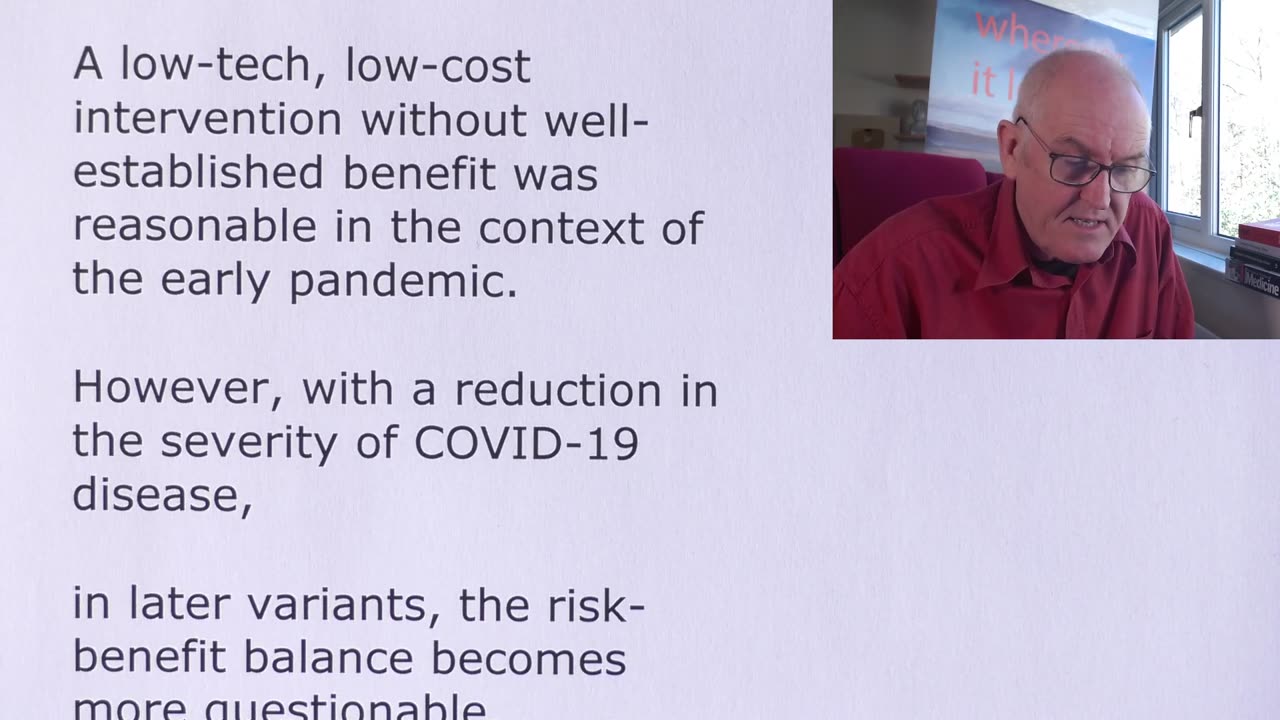Premium Only Content

Wearing masks did not prevent covid
Conclusions, Utilising a robust quasi-experimental approach,
we found no evidence that a mask policy significantly impacts the rate of nosocomial SARS-CoV-2 infection (with the Omicron variant)
Unmasking the mask: a time-series analysis of nosocomial COVID- 19 rates before and after removal
https://drive.google.com/file/d/1oZ29hRam4CXGqUFxe-Lh-_l-VCqQwXFT/view
ECCMID 2023, abstract 5979
Reports and Proceedings
EUROPEAN SOCIETY OF CLINICAL MICROBIOLOGY AND INFECTIOUS DISEASES
B. Patterson , R. Mehra , A. Breathnach
St George's Hospital – London
Background
Mask wearing has been part of a package of infection control measures employed to reduce nosocomial COVID-19 throughout the pandemic.
A low-tech, low-cost intervention without well-established benefit was reasonable in the context of the early pandemic.
However, with a reduction in the severity of COVID-19 disease,
in later variants, the risk-benefit balance becomes more questionable.
Methods
Routinely collected infection control data
Nosocomial SARS-CoV-2 infection over a 40-week period
The intervention (study group)
Removal of a staff/visitor surgical mask-wearing policy,
for the majority of wards at week 26 of this period
Control group
Subset of specific wards retaining the mask policy
For both groups
Underlying community infection rate,
identified by unselected admission screening.
Omicron variant was the dominant strain throughout the period
Results for study group
In the context of a surge in SARS-CoV-2 infection,
removal of the mask policy was not associated with a statistically significant change in the rate of nosocomial SARSCoV-2 infection,
Incidence Rate Ratio (IRR) 1.11
and no post-intervention identifiable trend,
(to suggest a delayed effect)
IRR 1.01
Results for control group
No immediate change in infection rate
IRR 2.56
No delayed change in infection rate
IRR 1.08
Conclusions
Utilising a robust quasi-experimental approach,
we found no evidence that a mask policy significantly impacts the rate of nosocomial SARS-CoV-2 infection (with the Omicron variant)
While these data do not preclude a small effect,
the real-world benefit of this mitigation measure in isolation is likely to be modest within a healthcare setting.
https://www.cochrane.org/CD006207/ARI_do-physical-measures-such-hand-washing-or-wearing-masks-stop-or-slow-down-spread-respiratory-viruses
Key messages
We are uncertain whether wearing masks or N95/P2 respirators helps to slow the spread of respiratory viruses based on the studies we assessed.
Hand hygiene programmes may help to slow the spread of respiratory viruses.
Authors' conclusions:
The pooled results of RCTs did not show a clear reduction in respiratory viral infection with the use of medical/surgical masks.
-
 2:32:19
2:32:19
DemolitionDx
3 hours agoSunday night COD with friends.
29.6K1 -
 2:10:14
2:10:14
vivafrei
13 hours agoEp. 237: More Trump Cabinet Picks! MAHA or Slap in the Face? Canada on Fire! Go Woke Go Broke & MORE
171K220 -
 2:23:21
2:23:21
SOLTEKGG
3 hours ago $2.80 earned🟢 First Day on RUMBLE!
30.2K3 -
 LIVE
LIVE
Vigilant News Network
7 hours agoCOVID-Vaccinated Hit With Grave New Reality | Media Blackout
2,160 watching -
 1:26:31
1:26:31
Josh Pate's College Football Show
7 hours ago $2.20 earnedSEC Disaster Saturday | Major CFP Earthquake Coming | Officiating Is A Disaster | New Studio Debut
21.4K1 -
 1:43:05
1:43:05
Adam Does Movies
10 hours ago $3.93 earnedGladiator II Spoiler Conversation With Hack The Movies
24K1 -
 24:10
24:10
Bwian
10 hours agoI Don't Know What I'm Doing in Fortnite, But I Still Won...
18.9K1 -
 19:30
19:30
DeVory Darkins
12 hours ago $40.75 earnedJoe Rogan MOCKS The View as Bill Maher HUMILIATES Woke Scientist
94K125 -
 11:25:41
11:25:41
Scottish Viking Gaming
14 hours agoSUNDAY FUNDAY | Jump into my Sons of the Forest Game | DOO EET NOWWA!
92.7K1 -
 24:01
24:01
Winston Marshall
4 days agoThe TRUTH About The UK Farmer Protest What No One Is Talking About...
84.3K251